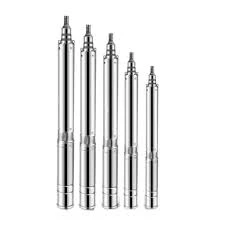Dec . 28, 2024 13:30 Back to list
which is better oil filled or water filled submersible pump
Which is Better Oil-Filled or Water-Filled Submersible Pumps?
Submersible pumps play a crucial role in various applications, from irrigation to sewage management. They are designed to operate underwater, facilitating the movement of water or other fluids from one area to another. Two common types of submersible pumps are oil-filled and water-filled pumps, each possessing distinct characteristics, advantages, and drawbacks. In this article, we will explore the key differences between these two types of pumps to help you determine which is better for your specific needs.
Oil-Filled Submersible Pumps
Oil-filled submersible pumps are equipped with a motor that is submerged in oil rather than water. This oil serves multiple purposes; it lubricates the motor components and facilitates heat dissipation. The primary advantage of oil-filled pumps is their enhanced efficiency and durability. The oil provides superior cooling properties, which can lead to a longer lifespan for the pump. Additionally, the lubricating qualities of the oil reduce wear and tear on mechanical parts, minimizing maintenance needs.
These pumps are typically used in applications where water is not the primary medium, such as in mining operations or dewatering projects in industrial settings. Due to their robust construction and ability to handle abrasive materials, oil-filled pumps can withstand harsher conditions compared to their water-filled counterparts. However, one of the potential downsides of oil-filled pumps is the risk of oil leaks, which can pose environmental hazards if not managed properly.
Water-Filled Submersible Pumps
In contrast, water-filled submersible pumps use water as the main cooling and lubricating agent for the motor. This design is usually simpler and more cost-effective. Water-filled pumps are widely used in residential and agricultural applications, such as draining basements, flooded areas, or as part of irrigation systems. They are typically easier to maintain and repair, as they do not require specific oil types and can be disassembled with relative ease.
One of the primary advantages of water-filled pumps is their environmental safety. Since they do not contain oil, there is no risk of leaks contaminating water sources. Additionally, these pumps are generally lighter and more portable, making them ideal for smaller-scale operations or where mobility is a factor. However, they tend to be less efficient than oil-filled pumps, particularly in high-temperature situations, as water does not provide as effective a cooling medium. Consequently, they may have a shorter operational lifespan under stress.
which is better oil filled or water filled submersible pump

Choosing Between Oil and Water-Filled Pumps
When deciding which type of pump is better for your needs, consider several factors
1. Application Are you dealing with a harsh industrial environment, or will your application be more residential or agricultural? Oil-filled pumps are better suited for demanding conditions, while water-filled pumps are more versatile for general use.
2. Environmental Concerns If you are particularly focused on minimizing environmental impact, water-filled pumps have the advantage because of their lack of oil.
3. Maintenance and Repair Consider your ability or willingness to perform maintenance. Water-filled pumps are generally easier to maintain, while oil-filled pumps may require more attention to ensure there are no leaks.
4. Budget Upfront costs can vary significantly. Oil-filled pumps generally come at a higher price due to their robust construction, while water-filled pumps can be more economical.
Conclusion
Ultimately, the choice between oil-filled and water-filled submersible pumps depends on your specific requirements and environmental considerations. Both types have their advantages and disadvantages; therefore, assessing your application will help you make an informed decision. Whether you prioritize efficiency, maintenance, environmental safety, or cost, there is a suitable pump for your needs. When selecting a pump, it's also wise to consult with a professional to ensure you choose the right system for your specific application and conditions.
-
Submersible Water Pump: The Efficient 'Power Pioneer' of the Underwater World
NewsJul.01,2025
-
Submersible Pond Pump: The Hidden Guardian of Water Landscape Ecology
NewsJul.01,2025
-
Stainless Well Pump: A Reliable and Durable Pumping Main Force
NewsJul.01,2025
-
Stainless Steel Submersible Pump: An Efficient and Versatile Tool for Underwater Operations
NewsJul.01,2025
-
Deep Well Submersible Pump: An Efficient 'Sucker' of Groundwater Sources
NewsJul.01,2025
-
Deep Water Well Pump: An Efficient 'Sucker' of Groundwater Sources
NewsJul.01,2025
-
 Submersible Water Pump: The Efficient 'Power Pioneer' of the Underwater WorldIn the field of hydraulic equipment, the Submersible Water Pump has become the core equipment for underwater operations and water resource transportation due to its unique design and excellent performance.Detail
Submersible Water Pump: The Efficient 'Power Pioneer' of the Underwater WorldIn the field of hydraulic equipment, the Submersible Water Pump has become the core equipment for underwater operations and water resource transportation due to its unique design and excellent performance.Detail -
 Submersible Pond Pump: The Hidden Guardian of Water Landscape EcologyIn courtyard landscapes, ecological ponds, and even small-scale water conservancy projects, there is a silent yet indispensable equipment - the Submersible Pond Pump.Detail
Submersible Pond Pump: The Hidden Guardian of Water Landscape EcologyIn courtyard landscapes, ecological ponds, and even small-scale water conservancy projects, there is a silent yet indispensable equipment - the Submersible Pond Pump.Detail -
 Stainless Well Pump: A Reliable and Durable Pumping Main ForceIn the field of water resource transportation, Stainless Well Pump has become the core equipment for various pumping scenarios with its excellent performance and reliable quality.Detail
Stainless Well Pump: A Reliable and Durable Pumping Main ForceIn the field of water resource transportation, Stainless Well Pump has become the core equipment for various pumping scenarios with its excellent performance and reliable quality.Detail
